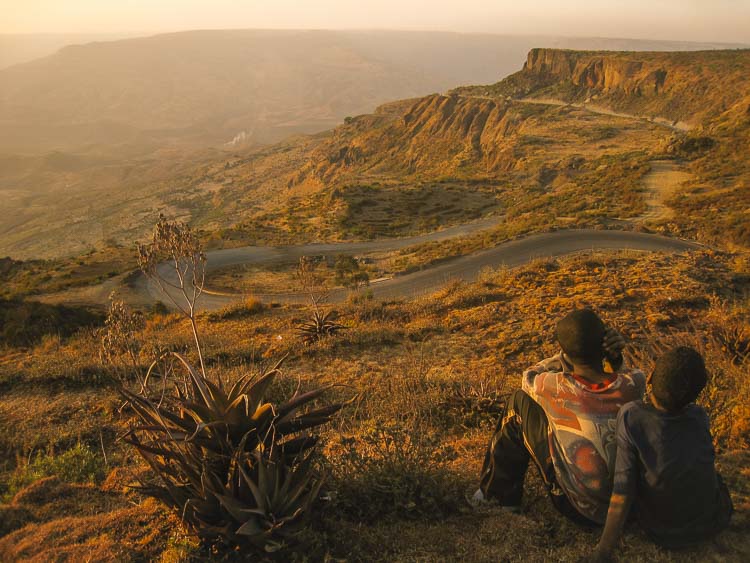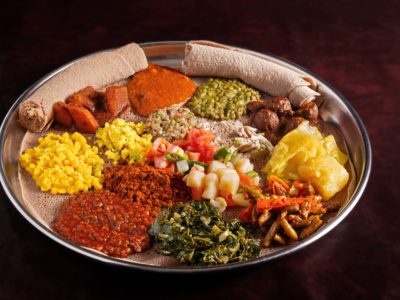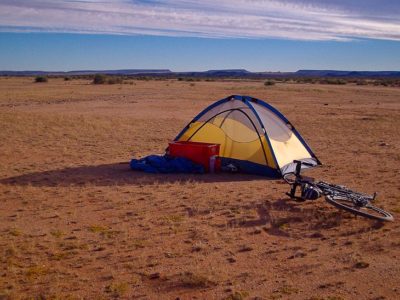Located in the Horn of Africa, Ethiopia is the second most populated country in Africa.
Located in the Horn of Africa, Ethiopia is the second most populated country in Africa.
Other than the fact that this African country was never colonized by a European power (along with Liberia), Ethiopia is known for its rich culture, delicious coffee, unforgettable landscapes, and friendly people.
It is also the only African country that has its own alphabet (an alpha-syllabary) which consists of 209 symbols and 25 letter variants.
This Ethiopia travel guide will help you plan your next vacation.
Table of contents
Table of Contents
Fast Facts about Ehtiopia
- Ethiopia power voltage is 220V 50Hz; Plug C, E, F & L
- Ethiopian currency is the Ethiopian birr and is around 20.8 ETB to 1 USD
- Proof of an onward or return ticket is frequently asked for upon arrival in Ethiopia.
- If you are planning to enter Ethiopia by land, you will need tourist visa in advance from your local Ethiopian Embassy.
- A yellow fever vaccination is not obligatory in order to enter Ethiopia, but if you have recently traveled to a country where it is present then you will need proof of immunization.
- Avoid travel to the border with Kenya, Somalia, Sudan, South Sudan and Eritrea due to lack of security and a threat of violence and kidnapping
- Several vaccinations are highly recommended including Yellow Fever, Typhoid, Hepatitis A, Hepatitis B and Meningitis.
- The water is not potable; drink only bottled water.
- SIM Cards: If you are planning on staying in Ethiopia for longer than a week, bring a cellphone to confirm flights, book tickets, call taxis etc.
- Only select stores sell SIM cards but you can buy refill cards almost anywhere!
- SIM Cards: You can get a local sim card from Vodafone or Orange in Cairo. We suggest getting a SIM card at the airport when you arrive.
Things to See and Do in Ethiopia
- Erta Ale: Come see the most active volcano in Ethiopia. Famed for its persistent lava lake in the crater, it makes a great sight for those ready for the adventure up the volcano.
- Blue Nile Falls: One of the most popular places in Ethiopia,take a short hike through the countryside to see this magnificent waterfall. Standing at 138 feet, fans of nature will love this. You might get lucky and also see a rainbow.
- See where the Blue and White Nile Meet
- Lalibela Churches: Declared a UNESCO World Heritage Site, visit these historical 11 churches. Made from a single rock 900 years ago, these churches are a stunning sight, as well as culturally significant for members of the Ethiopian Orthodox Church.
- National Museum of Ethiopia: Learn more about Ethiopia by visiting this museum. Featuring exhibits, Ethiopian art, and fossils from extinct creatures, the museum also includes “Lucy”, a partial skeleton from a human who lived 3 million years ago.
- Simien Mountains National Park: Featuring rare Gelada baboons and Walia ibex, spend a day at this park. Activities include the Jinbar Waterfall, Ras Dashen (highest mountain in Ethiopia), and hiking through Mount Bwahit.
- Fasil Ghebbi: Head to Gondar to see these impressive ruins from a 17th-century fortress city. Once home to Ethiopian emperor Fasilides, it is now a unique journey into the past.
Budgeting
Accommodation
Budget: You can find budget guest houses and hotels for 325-600 ETB per night. These places come with simple rooms, a lounge area, free breakfast and Wi-Fi, and a hotel restaurant and bar.
Mid-Range: You can find mid-range hotels for 1,175-1,825 ETB per night.Enjoy private rooms and suites with minibars and tea/coffee, a hotel restaurant and bar, a gym, an indoor or outdoor pool, room service, and airport shuttle.
High-End: You can find five-star hotels in the price range of 2,940- 8,250 ETB per night. Amenities include private suites with living rooms, free breakfast, multiple hotel restaurants, a cocktail bar, spa services, a gym, a swimming pool, and hot tub, and room service.
Food
Spicy meat and vegetables are a staple of Ethiopian cuisine. At the same time, members of the Ethiopian Orthodox Church abstain from eating animal products every Wednesday and Friday, and so there are many vegetarian dishes/alternatives available as well.
The national dish is Doro Wat (spicy chicken stew). Other popular meals include Tibs (sautéed meat strips), Shiro be Kibbe (legume stew), and wat (stew made from meat, vegetables, spices, and clarified butter). You can also look for Injera, a sour flatbread that’s very popular.
There are sit-down restaurants where you can sample more of Ethiopia’s cuisine. In total, you can expect to pay 1030 ETB per day in major cities like Addis Ababa or 450 ETB for smaller cities.
The Best Ways to Get Around Ethiopia
Getting to Ethiopia:
Flights: Addis Ababa Bole International Airport, located 3.7 miles from the city center of Addis Ababa, is the main airport to fly into. You can check for the best flights to Ethiopia on Skyscanner.
Transportation:
Buses: Buses are a cheap way to get around. Minibuses are best for traveling throughout towns, though you can also take them to go between cities.
A trip on a minibus from Gondar to Bahir Dar, for example, will cost about 20 ETB. You can also look for luxury buses that are air-conditioned and travel between cities. Take a luxury bus from Addis Ababa to Bahir Dar for 340 ETB. Tickets for luxury buses should be booked at least a day in advance.
Taxis: You can find two types of taxis—shared and private.Shared taxis willfollow certain routes and include multiple passengers in a cab (similar to a bus), while private taxis do not have fixed destinations. It is best to negotiate the fare at the start of the trip and check around to make sure you are being given a fair price.
Car Rental: You can find car rentals that come with an experienced driver. Self-driving is not possible in Ethiopia due to the conditions of the roads. Prices start at 3,530 ETB per day.
Uber: No Uber, but there is ZayRide, a taxi app similar to Uber.
When to go To Ethiopia
The best time to visit Ethiopia is during the dry season of October through June. The dry season means there is less of a chance of rainfall, which makes it great for outdoor activities. It is also the period when nature is at its peak beauty, particularly in the highlands.
Where to Stay in Ethiopia
Best Western Plus Addis Ababa: When in Addis Ababa, stay at this popular hotel. Just a 20-minute ride from the National Museum of Ethiopia and Holy Trinity Cathedral, the hotel comes with free breakfast and Wi-Fi, room service, an indoor pool, a spa, a fitness center, and a hotel restaurant and bar.
Sora Lodge Lalibela: Come stay at this well-rated hotel in Lalibela and see great views of the Asheten Mariam Mountain. The Church of Saint George and Bete Maryam are both just 5-6 minutes away by car. If you prefer to stay indoors, the hotel includes three choices of rooms (standard, rock-hewn, and tukul rooms), free breakfast, a hotel restaurant and bar, room service, an airport shuttle, and laundry service.
Goha Hotel: Located 1.8 miles from Fasil Ghebbi and Fasilides Palace, this is a great place for seeing some top destinations or just for staying inside. With Goha Hotel being situated on a hill, you can see great views of Gondar from the hotel while enjoying the hotel restaurant that serves European cuisine, live entertainment, an outdoor pool, a café, a hotel bar, and sun loungers.
Check out our favorite booking platforms Booking.com, Tripadvisor and VRBO for the best deals on accommodation.
What to Pack for Ethiopia
Ethiopia is in the tropical zone lying between the Equator and the Tropic of Cancer.
It has three different climate zones according to elevation: tropical, subtropical and cool zone.
The dry season is from September through to March, which is the best time to travel to Ethiopia.
There are two rainy seasons, the belg (short rains) in April and May and the long rains from July through to the end of September.
- Waterproof bag – the bag has two functions, protecting your stuff from the rain and also from the dust, especially if you’re travelling to drier regions.
- Personal Safety products – Addis Ababa is a safe city with little violent crime but lots of petty theft. As Jill from Jack and Jill Travel explains, “I’d never experience so many attempts at pickpocketing in such a short amount of time before.” Some tips include being extremely careful when leaving/arriving by bus in Meskal Square while also avoiding the use a backpack with anything valuable in it in Merkato. Before leaving for your trip, make sure to pack some personal safety products, like money belts and locks, so that you can keep your valuables safe on your trip.
- Protection from the elements – pack sunscreen, sunglasses, a hat and bug-spray to prevent getting bitten by a mosquito (that might have malaria!).
- Avoid packing dark colored clothes – tsetse flies are drawn to dark colors, like blue and black clothing, and their bite can give you African Sleeping Sickness. Stick to light, neutral colors but avoid packing white clothes as they will get dirty and dusty pretty quickly.
- Footwear – Pack a pair of lightweight, durable and comfortable shoes that you don’t mind getting dirty!
- Layers – pack the basic tropical clothes and make sure to include long pants, long-sleeve tops and some warm clothes for those chilly nights.
See our packing tips: packing list for smart travel & How to Pack for a Safari
Ehtiopia Travel Guide: Best Booking Resources
Whenever we travel to we make sure to start with these companies. We have tried a lot of different ones over the years and all of these have consistently proven to be the best when it comes to offering great prices.
We have used every one of these personally and continue to do so.
- Booking.com: This is our go site to when comparing prices for accommodation. It usually has the cheapest prices, especially in Europe and we love their interface. Not to mention you get free cancellation and you are guaranteed the best price.
- Trip Advisor: What we like about Trip Advisor is that we can look at all the reviews and then book our accommodation. TripAdvisor is where we go when we want to compare prices with multiple accommodation providers.
- VRBO: is the main search engine we use when we are looking for a home or apartment rental. It can sometimes be cheaper than hotels and it is the best way to stay in areas that offer a more local feel.
- Hostelworld: With one of the largest databases of hostels in the world, Hostelworld is the go-to site when you are looking for budget accommodation.
- Skyscanner: This is the first place we check for flights. It consistently comes back with the cheapest and best options. It allows us to compare a lot of airlines to get the best price.
- Rome 2 Rio: If you want to see how to get somewhere by plane, train, bus, ferry or car Rome2Rio lays it all out for you as well as related costs.I love how they show it all to you on a Google Map and it works offline.
- Get Your Guide: For all your day trip and city guide needs, we use Get Your Guide. It has the world’s largest collection of things to do with more than 30,000 activities in 7500 destinations.
- World Nomads Insurance: When traveling to Italy you should always have travel insurance. We have found the best bang for your buck is by far World Nomads.
Ethiopia Travel Guide: Related Articles
To browse all our articles and guides about Ethiopia click here.



